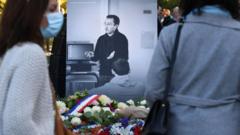In the Paris judicial system, a significant case unfolds as eight individuals accused of aiding in the jihadist murder of French high-school teacher Samuel Paty await their verdict after a trial that has stretched over six weeks. The tragic event, which occurred in October 2020, shocked France and raised critical questions around the implications of speech and responsibility.
The charges against the defendants include the father of a schoolgirl, whose misleading account of Paty’s classroom conduct triggered online outrage leading to his assassination by a radicalized Islamist teenager, Abdoullakh Anzorov. Although the teenager was shot dead by police shortly after committing the murder, the spotlight now falls on those who played a role in the events leading up to this tragedy. The prosecution argues that statements made by certain individuals indirectly paved the way for the attack, creating a highly charged legal debate about accountability.
Among those on trial is the girl’s father, Brahim Chnina, who publicly denounced Paty based on his daughter's false claims regarding alleged discriminatory behavior towards Muslim students. Additionally, a Muslim activist actively instigated online protests against Paty, while two friends of Anzorov purportedly assisted him in accessing weapons for the attack. The prosecution argued that their actions, while not directly intending to harm, contributed to a climate that made the murder possible.
Legal intricacies abound as the defense contends that the accused should not be held liable for acts of violence they did not foresee. The trial has featured emotional testimonies, including from the now 17-year-old schoolgirl, Z. Chnina, who expressed remorse for her earlier statements. Her admission that her falsehoods played a part in the tragedy has further complicated the legal dialogue as it raises questions of moral responsibility versus criminal culpability.
The case has its roots in a politically charged atmosphere stemming from years of tensions over freedom of expression, particularly surrounding the controversial depictions of the Prophet Muhammad by Charlie Hebdo—a satirical magazine that has faced extreme violence due to its content. These events create a backdrop that contextualizes the heightened risk of radicalization and violence.
Ultimately, the court must decide if the defendants’ words can be classified as "terrorist association" despite their claims of ignorance about Anzorov’s intentions. The outcome could reshape future legal standards concerning freedom of speech and the limits of expression in an age where digital communication plays a pervasive role in societal actions and reactions.
The charges against the defendants include the father of a schoolgirl, whose misleading account of Paty’s classroom conduct triggered online outrage leading to his assassination by a radicalized Islamist teenager, Abdoullakh Anzorov. Although the teenager was shot dead by police shortly after committing the murder, the spotlight now falls on those who played a role in the events leading up to this tragedy. The prosecution argues that statements made by certain individuals indirectly paved the way for the attack, creating a highly charged legal debate about accountability.
Among those on trial is the girl’s father, Brahim Chnina, who publicly denounced Paty based on his daughter's false claims regarding alleged discriminatory behavior towards Muslim students. Additionally, a Muslim activist actively instigated online protests against Paty, while two friends of Anzorov purportedly assisted him in accessing weapons for the attack. The prosecution argued that their actions, while not directly intending to harm, contributed to a climate that made the murder possible.
Legal intricacies abound as the defense contends that the accused should not be held liable for acts of violence they did not foresee. The trial has featured emotional testimonies, including from the now 17-year-old schoolgirl, Z. Chnina, who expressed remorse for her earlier statements. Her admission that her falsehoods played a part in the tragedy has further complicated the legal dialogue as it raises questions of moral responsibility versus criminal culpability.
The case has its roots in a politically charged atmosphere stemming from years of tensions over freedom of expression, particularly surrounding the controversial depictions of the Prophet Muhammad by Charlie Hebdo—a satirical magazine that has faced extreme violence due to its content. These events create a backdrop that contextualizes the heightened risk of radicalization and violence.
Ultimately, the court must decide if the defendants’ words can be classified as "terrorist association" despite their claims of ignorance about Anzorov’s intentions. The outcome could reshape future legal standards concerning freedom of speech and the limits of expression in an age where digital communication plays a pervasive role in societal actions and reactions.





















